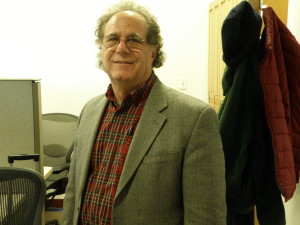Veteran & Educator Still Fighting for Veterans Rights
By Keith Barile
Special to the Live Wire
In the mid-1970s, the Vietnam War was winding down and thousands of soldiers were returning to their hometowns to begin their “post war” lives. Because the G.I. Bill afforded veterans the chance to get an education, soldiers returning to the “world” began to take advantage of this benefit. One of those soldiers was David Litrico, a Manchester native, graduate of Manchester
High School and now an adjunct professor of English at Manchester Community College.
Litrico had just finished up an eight year stint in the Navy, during which he served four tours in Vietnam, from 1966 to 1972. He left Vietnam for the final time on March 31, 1972, and by August of that same year he was enrolled as a student at MCC
Though he was a bit “burned out” from his years of service, Litrico said, he felt comfortable at MCC.
“It was the most beautiful place ever,” he said of his first impression of the campus, which then consisted of just one temporary building.
After he enrolled, he said, he almost immediately became active with other veterans on campus. Over time, the veterans formed a Veteran’s Club, which was eventually granted a large office by the first MCC president, Fred Lowe. This enabled them to reach out to more vets
and to establish a much needed oasis for the veterans. Litrico said he spent many hours volunteering, helping vets file paperwork and giving advice. He estimated that there were about 3,000 vets on campus at that time, so there was always someone in need of his help.
Litrico’s dedication to veteran’s issues expanded beyond MCC. At about the same time that the vets at MCC were organizing, the Vets Club at the University of Connecticut began a campaign to convince the State Legislature to waive tuition for veterans in Connecticut. Litrico said that it “wasn’t easy at first” to get the legislators on board. But through diligence and hard work, the vets were able to convince the legislature, during its 1973-74 session, to waive 50 percent
of the veteran’s tuition. That victory helped motivate veterans in the state to fight for a waiver of all vets tuition.
The following year, having learned much about how the government worked, and with the assistance of some new allies, like Gary Waterhouse, now the Veterans of Foreign Wars representative for Connecticut, former U.S. Senator Joe Lieberman, Roy Driver from Central Connecticut State University, and others, the vets returned to the capitol. With a renewed spirit and determination, they went to work.
“We spent and unbelievable amount of time at the capitol,” Litrico said, adding that he would pack lunches of bologna sandwiches so they wouldn’t have to leave. “We practically slept up there!”
The hard work paid off during the 1974-75 legislative session, when veterans were granted a full tuition waiver.
From that experience Litrico said he learned that “the people run the government, the government doesn’t run them,” and he encourages anyone who wants to see change to make an effort.
Today, almost every state in the country extends some kind of tuition waiver to its veterans, but there are other hurdles to overcome. Currently, there is a movement to get residency waivers for veterans in states that require in- state residence to qualify for tuition waiver. Twenty states have already approved such residency waivers and nine more have pending legislation. Connecticut is not among those states.
It is becoming increasingly difficult for vets to afford school, according to a recent study by Rand, which found that 78 percent of vets at two year schools and 64 percent at four year schools cited the difficulty of supporting themselves and family as a moderate to major challenge.
Litrico said it should be paramount to the citizens of this state and country that veterans get the help they need to educate themselves and reach their goals.







